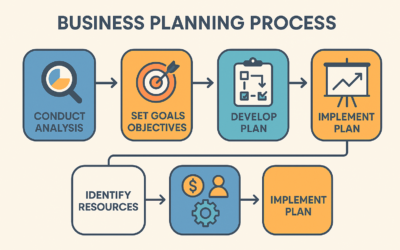The nature of small businesses is that successes are built on top of each other. Every month, you may face a new challenge — and it’s up to you to deal with those issues. This article will look at how to grow your business as a small business owner.
1. Think big and take small steps
Planning is key. First, you need to decide on a plan and then execute it.
When you’re planning your business, there are a few things that you should consider:
- What is my goal? Is it money or time? If so, what steps will help me get there?
- How much money do I need to make each month to live off my profits indefinitely?
- Will this amount be enough if I don’t have any other sources of income (or even just one)?
- Where am I going with my company right now—what do I want out of owning a small business like this one (i.e., growth)? Will taking risks result in greater rewards down the road?
2. Build your team
Hiring the right people is one of the most important things you can do to grow your business. If you’ve hired someone who doesn’t work well with others, or if they’re not a good fit for your company culture, it will be impossible for them to help grow your business.
It’s also important that you train and motivate your employees, so they know what is expected from them in terms of performance and attitude. You want everyone on board before starting any new project or initiative!
3. Research your market
A key step to growing your business is knowing your market. You need to know who you’re selling to, what they buy from you, and their needs. This means researching the industry in which you operate and doing some research on competitors in this space.
When looking at trends or hot topics in your industry, it’s also important to consider how things could affect your target audience—and vice versa!
4. Promote, advertise, and sell
To get people talking about you, you must use various marketing strategies: social media, print ads, and more. These can be used in conjunction with each other or even on their own, depending on what works best for your brand.
As for selling your products or services online, there are many ways small businesses can do this without spending too much money: affiliate programs, paid advertising such as Google AdWords, email lists, etc. You could also consider using an e-commerce platform like Shopify or Bigcommerce if you don’t have any experience running an online store yet!
5. Track everything you do
Tracking is important for small businesses because it allows you to learn about what works and doesn’t. You can use this data to improve your processes and ensure you’re always improving.
For instance, you can use a spreadsheet program (Microsoft Excel, Google Docs) or an app like Trello or Asana. These programs make it easy to create lists of tasks that need completing, then add notes as each item gets done. This makes tracking easy—and also gives everyone on your team access to the same information about progress toward goals!
6. Being flexible and responsive
Flexibility and responsiveness to a growing business are key milestones in building a small business. As your customer base grows, you’ll need to expand to meet the needs of more people.
You can do this by:
- Adding new products or services that meet customer needs (e.g., offering discounts on larger orders)
- Updating your website with helpful information about your products and services (e.g., adding videos)
- Making sure all employees have clear instructions for dealing with customers who have questions
Conclusion
As business analysts like Global Resources Reviews put it, 70% of new start-ups fail, and the reason is not far-fetched. What makes businesses successful, and others fail is not unrelated to properly implementing these strategies.
Your search for knowledge as a small business owner, however, does not end here. As new trends hit the market daily, you must keep informed and find new ways to key invaluable information that boosts your business.

0 Comments